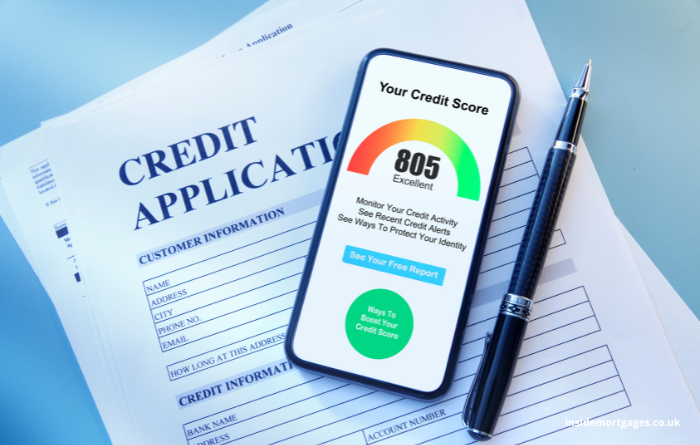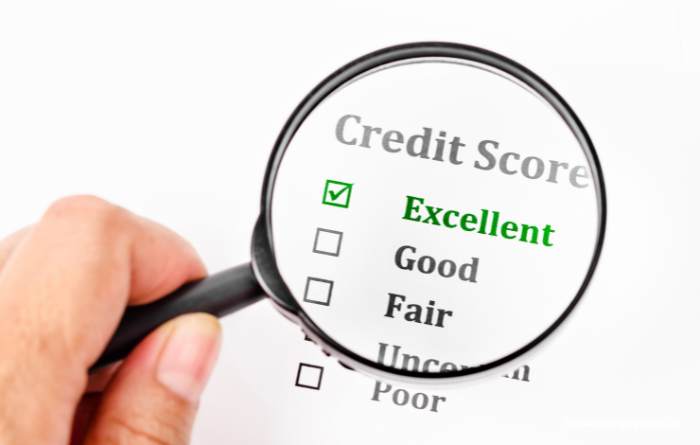What Is A Good Credit Score For A Mortgage UK?
The exact range for achieving a ‘good’ credit score for a mortgage in the UK varies between credit reference agencies (CRAs) as they each have their own scoring systems. There are 3 main CRAs in the UK that are used to measure credit scores; Experian, TransUnion and Equifax. Experian’s good rating is between 881 to 960, TransUnion’s good rating is between 604 to 627, and Equifax’s good rating is 420 to 465.
Taking steps to ensure that you have the best credit score possible will increase your chances of being approved for a mortgage and also potentially reduce the interest rate you are offered on your mortgage repayments.
Read on for a simple overview of credit scores, why they are important when buying a property, how to improve your credit score, and what to do if you have a poor credit rating.
What Is A Credit Score?
Your credit score is a three-digit number that lenders use to determine your creditworthiness. It’s based on information from your credit report, and it indicates how likely you are to repay a loan or make timely payments.
A good credit score indicates that you have been reliable in your history of payments and have demonstrated an ability to manage debt responsibly. Generally, the higher your credit score is, the more likely you are to receive a better mortgage rate and be approved for a loan.
Does Everyone Have A Credit Score?
Everyone has the potential to have a credit score, but not everyone takes the necessary steps to generate one. To form a credit score and credit history, you must establish yourself with creditors. This can be done by making use of different sorts of credit such as loans, store cards, overdrafts, credit cards or other financing options. Alternatively, most banks offer people ages 18+ the opportunity to open up a secure card regardless of their past debt.
Once you’ve taken one of these routes, your payment history will be tracked, reported, and you’ll begin to build up a record of trustworthiness with creditors that translates into your overall credit score. As long as you’re consistently making payments on time and meeting all other requirements of being a responsible borrower, your score should steadily climb.
What Is Credit?

Credit is an important part of the financial system. It allows people to make a purchase even if they don’t have sufficient funds in hand. Credit can take several forms; a loan from a financial institution, retail credit from a store, or even using credit cards.
For example, not many people have enough cash in the bank to purchase a home outright. This means they have to rely on credit in the form of a mortgage from a lender to finance the purchase. The amount owed is then repaid with interest.
When using credit, it’s important to understand the terms and conditions before taking on any new debt. Different banks may offer different rates and payment options and all should be looked into carefully.
Having good credit standing can also open up opportunities for furthering your financial goals such as being able to apply for larger or interest-free loans. Knowing your credit score and managing it responsibly can help individuals build their financial health responsibly and effectively.
What Factors Impact A Good Credit Score?
Your credit score is impacted by factors such as:
- payment history, including any missed or late payments to creditors
- the total amount owed,
- length of credit history,
- debt to income ratio
- credit utilisation,
- credit account stability
- Other information such as county court judgements or bankruptcy also make up part of your score
- types of credit used
- the number of new credit enquiries,
- if you’re in a linked financial situation, such as if you are married or have joint finances, or debts, your credit score can also be affected by your partner’s credit history. It’s important therefore to check both of your credit reports before applying for a mortgage and to only link your finances with somebody who you fully trust, as the impact of a poor credit rating can last for years. Linking occurs with joint mortgages, loans, bank accounts and sometimes utility bills.
- Your personal circumstances for employment and living. Employed people or those that own their own homes will likely generate a higher credit score than those with unstable work, are unemployed, or rent.
Do All Lenders Use The Same Credit Scoring System?
No, mortgage lenders will use different credit reference agencies when assessing your application for affordability criteria, and will also have their own internal credit scoring system that will be impacted by the credit score assigned by the CRA that they use.
As each CRA assesses your credit history a bit differently and uses a unique scoring system, this means that there isn’t one single golden number to aim for when it comes to getting a good credit score for a mortgage. As a result, the best thing that you can do before applying for a mortgage is to take steps to build your score as much as possible to give yourself a good chance of being accepted, regardless of which lender or credit score is used.
How Is A Credit Score Used When Buying A Home?

When you’re buying a home, your credit score is one of the main factors that lenders use to decide whether or not to offer you a mortgage. Lenders will check your credit score to determine if you’re likely to be able to repay the loan. If your credit score isn’t good enough, you may find it difficult to get approved for a mortgage.
It’s important to remember that different lenders may have different criteria when it comes to approving mortgages, so it’s worth shopping around and speaking with different lenders to find out which lender is the most likely to approve your loan. A mortgage advisor will be able to assist you with this.
What Other Factors Do Lenders Consider For A Mortgage?
In addition to your credit score, lenders also consider other factors such as income, job stability and debt-to-income ratio. To get a mortgage, you will likely need to provide evidence of your income and job stability as well as information about other debts that you may have. Lenders take into consideration how much debt they currently have and whether or not it is manageable before making their decision on the loan approval.
Having a good credit score for a mortgage in the UK is important but as lenders also use their own internal applicant scoring methods to assess an applicant’s creditworthiness too, it is possible to get a mortgage with a poor credit rating.
How your information is used to calculate your credit score can vary from lender to lender, so it’s important to understand how each one evaluates your creditworthiness. If you have a poor credit history, it’s worth talking to a mortgage advisor in the first instance.
A good mortgage advisor will be able to assess your finances, including your credit score, and then put you in touch with lenders that are more likely to accept a mortgage application from people with a low credit score. Most of the main high street lenders require high credit scores to be approved for a mortgage.
What Is The Impact Of A Good Credit Score?
Having a good credit score has benefits including:
- Having more options available for borrowing when needed compared to others with lower scores. This could include things such as applying for a new credit card, bank loan, or mortgage.
- It can also lower interest rates, resulting in a decrease in money paid out by the borrower over time.
- A good credit score could also affect aspects of daily life such as insurance costs, mobile phone contracts, and utility contracts, as some companies may use credit scores to determine rates and qualification requirements for some tariffs.
- Having a healthy credit score may qualify individuals for better rental and housing opportunities because landlords and lenders may take into account your credit history when making decisions.
How To Check Your Credit Score
In the UK, it is possible to check your credit score for free. Credit reference agencies such as Experian and Equifax offer free services which allow you to access a copy of your credit report, as well as receive regular updates about changes to your score. These services also provide helpful advice and tips on how to improve your credit score.
How To Improve Your Credit Score

One of the most important steps towards financial independence is improving your credit score. To enhance your credit score, it’s essential to:
- Stay on top of your finances, including bill payments. An easy way to do this is to automate payments by setting up direct debits as soon as you receive an invoice.
- Avoid taking out too much debt and don’t apply for credit regularly.
- If you have a credit card, make sure you pay the balance off in full every month and don’t take cash out on them as this indicates poor money management to lenders
- Register to vote as without being on the electoral roll you are unlikely to get credit
- Check your credit report regularly to ensure that all the information is correct. If there are any errors, you should contact the lender right away to sort them out. Incorrect information can impact your credit score.
- Check that your address history is up-to-date
- Avoid payday loans and other short-term lendings. This is often a cause for mortgage application rejection for many lenders.
- If you and your former partner have separated, find out how to delink your financial ties.
- If you have a bad credit score or other financial problems, remember that there are options available to help. Speak to a financial advisor who can provide tailored advice and guidance
Ultimately, the key to improving your credit score is very simple: be responsible with your finances and make sure you always meet debt payments on time. Building a good credit score won’t happen overnight, but with dedication and patience, it’s possible to significantly improve your credit score over time.
Impact Of Home Buying With Bad Credit
Buying a home with bad credit can be difficult and may require extra steps to ensure you get the best deal. If your credit score is very poor, it’s important to consider all of your options before applying for a mortgage. It’s also worth speaking to a financial advisor or mortgage broker who will be able to provide more tailored advice and access to lenders who may be more likely to approve your loan.
If you can get approved for a mortgage with bad credit, there may be restrictions on the type of property you can buy, such as the price or location of the home. You may also find that your interest rate is higher than if you had a good credit score, and you may have to pay a higher deposit.
It’s also worth considering other home-buying options if your credit is poor, such as getting help from family or friends, becoming joint tenants, or applying for government grants or schemes.
If you are determined to buy a home with bad credit, some lenders may be more likely to accept your application and provide a mortgage, even if you have poor credit. It’s important to shop around and speak with as many lenders as possible before making a decision.
Which Lenders Approve With Bad Credit Scores?
Individual lenders have different criteria for what they consider to be a good credit score for a mortgage, so it’s worth shopping around and speaking with different lenders to find out which lender is the most likely to approve your loan.
When looking for a lender to approve your home loan application, it’s important to consider all the options available. Some lenders specialise in providing loans to those with poor credit scores, so it’s worth researching these lenders and speaking to them directly.
Alternative lending institutions may also be an option, such as peer-to-peer lenders who use marketplaces to connect borrowers and lenders. These are often more flexible in their lending criteria than traditional banks, making them an ideal option for those with bad credit scores.
It’s also worth speaking to a financial advisor or mortgage broker to get tailored advice on your options. They can provide you with a range of lenders who may be more likely to approve your loan.
Finally, remember that there are government grants and schemes available to help those with bad credit scores buy a home. This could include assistance with the deposit or covering mortgage insurance costs. It’s worth researching all of your options before deciding on the best route for you.
Summary
A good credit score gives mortgage applicants the best choices when it comes to mortgage products, interest rates and repayment terms. Whilst there is no definitive single score that constitutes a ‘good credit score’ for a mortgage in the UK, anyone looking to take out a mortgage should take all the steps they can before applying, to ensure their credit score is as high as possible.
It is important to check your credit score regularly so you know how creditworthy you are in the eyes of lenders. You can do this by obtaining a copy of your credit report from one of the three major UK credit reference agencies: Equifax, Experian or TransUnion. Looking at your credit history will give you an indication of how likely you are to be approved for a mortgage and the steps you need to take to improve your credit score over time.
If your credit score is bad, it’s worth considering other home-buying options such as getting help from family or friends, becoming joint tenants, or applying for government grants or schemes. Alternatively, there may be lenders that specialise in providing loans to those with poor credit scores

